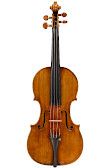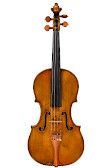Bartolomeo Giuseppe Guarneri "del Gesù"
1698–1744The entry in the baptismal register lists both of Guarneri’s Christian names, but later sources only note the second name. On his printed labels, Guarneri gave his first name as “Joseph” and added a stylized cross and the letters “IHS.” To distinguish between Giuseppe Guarneri father and son, posterity has referred to the son as “del Gesù.” No information is available about the training of the best-known representative of the Guarneri dynasty. However, he is thought to have learned the craft in his father’s shop, where he continued to work. In 1723, del Gesù married Caterina Roda from Vienna, and shortly thereafter, the couple appears to have left the parental home. Giuseppe briefly leased agricultural land, but from 1730, he returned to violinmaking. The first violins to bear his maker’s name were built during this period. However, they include instruments built together with del Gesù’s father. The family’s financial situation had been under strain for many years and was set to deteriorate further. When del Gesù’s mother died in 1737, he had to borrow money to pay for her funeral. He could not repay his debt, and the financial burden increased. Ultimately, del Gesù had to sell the family home. Bartolomeo Giuseppe Guarneri del Gesù died on October 17, 1744, and was interred in the parish church of San Prospero.
His career as a violinmaker, while short, produced a body of work that is unique in terms of the tonal quality and the particular appearance of his instruments. Although details like the shape of the arch, the cut of the f-holes or scroll design vary, del Gesù’s instruments nevertheless possess an unmistakable personal touch. This includes a certain lack of concern with steps that do not contribute to the violins’ acoustic quality. For instance, the purfling is frequently hastily inserted and irregular. Around 1800, Paganini obtained a del Gesù violin built in 1743 that he dubbed “il Cannone” (the cannon) for its huge sound and that he played throughout his lifetime. Since then, del Gesù’s violins have been highly prized solo instruments that command a price equal to that of Stradivari’s best instruments.


